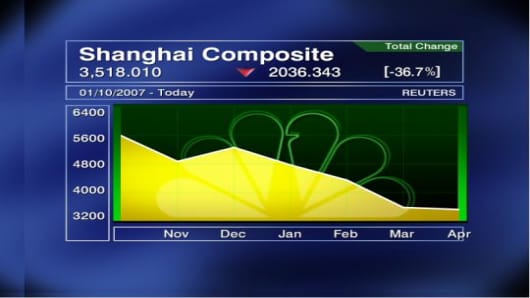Analysts and fund managers said the reduction in the stamp tax, to 0.1 percent from 0.3 percent, was likely to end a six-month bear market and could boost stocks by more than 20 percent in coming weeks.
The tax cut will make little difference to the investment costs of all but the most active traders. But investors see it as a signal that authorities want to put a floor under the market at about 3,000 points, to prevent a further slide from damaging the economy or possibly even causing social unrest.
The Shanghai Composite Index plunged 51 percent from last October's record peak to Tuesday's 13-month low of 2,990.788 points, dragged down by high inflation, the possibility of an economic slowdown this year, and heavy supplies of fresh equity.
But even before the tax cut was announced late on Wednesday, the index began rebounding from near technical support at 2,956 points, the 61.8 percent retracement of its bull run from mid-2005.
Many fund managers and analysts say that in the wake of the tax cut, the market is likely to recover to about 4,000 points in coming weeks, after which the health of the economy and corporate profits may determine stocks' direction.
A 38.2 percent retracement of the index's tumble from mid-January -- a reasonable expectation at the end of a downtrend -- would reach the 4,000 point area, technical analysis shows.
The long-rumored stamp tax cut went into effect today. The cut returns the stamp tax to its level last May, when the government raised it to cool the market, which had been surging in a two-year bull run that ultimately boosted the key index nearly six-fold.
Lin Songli, analyst at Guosen Securities in Beijing, said the decision was expected because the market had sunk as far as the government was willing to tolerate. "If the market continues to decline, it may hurt the real economy, especially domestic consumption," he said. "The next step for the government will be to slow down the approval of IPOs and the issuance of additional shares," he added.
Worries
The government has grown worried about mounting anger among ordinary investors, largely expressed in online forums, who had not counted on the stock market diving when they bought shares in its heady days.
The rocky market has also made fund-raising trickier for companies, as they have delayed initial public offerings to wait for conditions to settle.
Stocks tumbled 6.5 percent on the day after the stamp tax was tripled last May.
The market was a key topic at a meeting of China's State Council, or cabinet, on Wednesday, when Premier Wen Jiabao said the country's beleaguered stock exchanges had made real strides in recent years but still had a way to go before they could be considered mature.
Earlier Chinese media reports of the cabinet meeting said the government had discussed draft laws to beef up supervision of securities houses and require better risk management, but made no mention of the stamp tax cut.
"It is a long-term task to build a capital market that is transparent, efficient, rational in structure, perfect in function and safe in operation," Wen said, according to state radio.
The stamp tax delivered nearly 60 billion yuan ($8.60 billion) to government coffers in the first quarter this year, a drop in the bucket compared to overall tax revenues of 1.51 trillion yuan.
Some analysts have argued that a lower stamp tax would encourage a higher volume of stock trading, allowing the government to recoup lost revenues.


